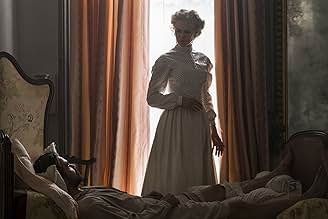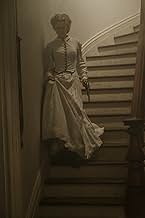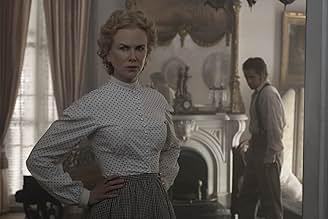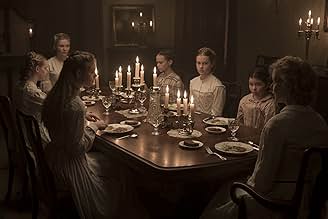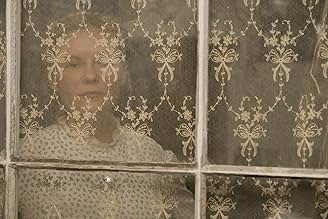The unexpected arrival of a wounded Union soldier at a girls school in Virginia during the American Civil War leads to jealousy and betrayal.The unexpected arrival of a wounded Union soldier at a girls school in Virginia during the American Civil War leads to jealousy and betrayal.The unexpected arrival of a wounded Union soldier at a girls school in Virginia during the American Civil War leads to jealousy and betrayal.
- Awards
- 5 wins & 26 nominations total
Wayne Pére
- Captain
- (as Wayne Pere)
Rebecca Hyland
- Mrs. Scurry
- (uncredited)
Eric Ian
- Confederate Soldier
- (uncredited)
Storyline
Did you know
- TriviaContrary to popular belief, McBurney's heritage was not changed to suit Colin Farrell's natural accent. The character is Irish in the book. Farrell was not initially going to use his Dublin accent but pushed to have the movie accurate to the original story.
- GoofsCorporal McBurney sets about sharpening a tool on a whetstone wheel in the garden during his rehabilitation. However, he spins the wheel towards himself as he begins to get it going. This is incorrect. The wheel should be spun away from the user, so that the tool "skims" over the surface, and doesn't have a chance of digging into the wheel and jamming the tool into the user.
- Quotes
[from trailer]
John McBurney: [screaming] What have you done to me, you vengeful bitches?
- ConnectionsFeatured in Film '72: Episode #46.4 (2017)
- SoundtracksLorena
Music by J.P. Webster (as Joseph Philbrick Webster)
Lyrics by Henry D.L. Webster
Performed by Oona Laurence (uncredited)
Featured review
A double-bill of THE BEGUILED, Thomas Cullinan's source novel is a civil-war drama positing a tantalizing scenario where a wounded union soldier fetches up in a southern all-girls' school, nurtured to recovery by the apparently good-willed women but also subjected to temptations from female gazes and one false move, he will go through purgatory of his sorry life.
The 1971 version is directed by Don Siegel, the third of his five collaborations with Clint Eastwood, who plays the Yankee Corporal John McBurney, and is discovered by a 12-year-old Amy (Ferdin, an absorbing talent), to whom he indulges with a peck on her lips, a blatant way to take away a child's first kiss (also pretty provocative by today's regressive yardstick), instantly, what Siegel hammers home to viewers is that he is not a humdinger, and through glimpses of fleeting flashback interleaved into the narrative, John emerges as a congenital liar, flippant and manipulative, currying favor from his petticoat accompany to slough from a possible fall of incarceration, whether it is Miss Marsha (Page), the headmistress of the seminary school, Edwina (Hartman), the virginal teacher to whom he claims his attraction, a nubile 17-year-old student Carol (Ann Harris), who is sexually active, even the slave Hallie (Mercer, a defiant soul hampered by her identity), cannot evade his come-ons.
The advent of a hot-blooded albeit bedridden male inevitably causes an erotic disruption among the exclusive distaff clique, whose members are circumspectly secluded from the battlefield merely outside their perimeter and sexually repressed, for pert, callow girls, they are inclined to project John as a perfect specimen of their untested sexual allure versus the opposite sex, in the cases of Edwina and Carol, one is the prudish committed type and the other is a wanton nymphet. But the most complex character amongst them is no doubt Miss Marsha, whose incest past and subliminal lesbian proclivity get a full treatment in the audacious script and visual presentation, the latter is even coalesced with a flagrant religious connotation to soup up the film's maverick idiom. When the crunches arrives, a man's conceit in his potency is punished by blunt castration and signifies a rude awakening of the priapic worship.
On top of his virile stallion credence, Clint Eastwood imbues a cunning, almost overweening facade which audience isn't familiar with, not cut from the same cloth from his hard-boiled tough-guy legend. Geraldine Page, emboldened by her matriarchal gravitas and demanding onus, doesn't shy away from any extraneous intrusion (the Union and the Confederacy alike) and builds a palpably beguiling tension through the mind games she plays with Eastwood yet holds the rein from stem to stern in unyielding resolution of taking the escalating situation in her own hands. Elizabeth Hartman, the fragile Oscar-nominated actress whose premature demise was a harrowing tragedy ripe for cinematic transposition, brings about something equally tangible and visceral as she is bedeviled by the discord between a man's promise and his action, but still holds out the last remaining benevolence out of her own impressionable nature.
Crowned BEST DIRECTOR in Cannes, Sofia Coppola's remake is an aesthetically beguiling psychological intrigue, superbly recreates a mystical Gothic quaintness in the closing days of the civil war entrapped within the terrain of a majestic mansion of the antebellum south, which certainly is a scintillating upgrade from the 1971 version's sepia retro flair.
But story-wise, Sofia's script not only eviscerates the role of Hallie (which is a double-edged sword since she claims that out of the respect of this sensitive issue, she doesn't want to tread lightly, but also can be easily accused of racially insensitive), but also leaves no allusions of all the taboo issues tackled in Siegel's movie, lesbian kiss, incest depravity and of course, that inappropriate kiss between a grown-up man and a teenage girl, are outright sanitized, and in fact, the whole story has been strenuously internalized, for instance, John's transgression, where is given a plausible justification in Siegel's film, is carried out in a slipshod manner, indicating that it is nothing less than a spur of horniness.
Atmospherical over dramatic, it is beyond reproach that Coppola opts to tell the allegory with her own agent, but unfortunately, the resultant impact doesn't meet up with expectation, especially when juxtaposed with its far more entrancing antecedent. Nicole Kidman intrepidly takes the mantle from Ms. Page, and actualizes an extremely sensual sponge-washing scene with Colin Farrell's less forthcoming and more sympathetic portrayal of a soldier turns paraplegic when he is subjected to an ambiguous retribution out of the necessity of saving his life. Kirsten Dunst and Elle Fanning don't make a splash in the shoes of Hartman and Ann Harris respectively, save Oona Laurence, whose Amy, precisely captures a child's malleable mentality.
So, the jury is out, the remake is humbled by the original, which is quite a shocker because on the paper, Coppola's feminine sensitivity seems to be more adept to parse this age-old gender axe battle than an action-inclined Mr. Siegel, again there is no sure thing in the film industry, and that is exactly why it keeps us intrigued every time.
The 1971 version is directed by Don Siegel, the third of his five collaborations with Clint Eastwood, who plays the Yankee Corporal John McBurney, and is discovered by a 12-year-old Amy (Ferdin, an absorbing talent), to whom he indulges with a peck on her lips, a blatant way to take away a child's first kiss (also pretty provocative by today's regressive yardstick), instantly, what Siegel hammers home to viewers is that he is not a humdinger, and through glimpses of fleeting flashback interleaved into the narrative, John emerges as a congenital liar, flippant and manipulative, currying favor from his petticoat accompany to slough from a possible fall of incarceration, whether it is Miss Marsha (Page), the headmistress of the seminary school, Edwina (Hartman), the virginal teacher to whom he claims his attraction, a nubile 17-year-old student Carol (Ann Harris), who is sexually active, even the slave Hallie (Mercer, a defiant soul hampered by her identity), cannot evade his come-ons.
The advent of a hot-blooded albeit bedridden male inevitably causes an erotic disruption among the exclusive distaff clique, whose members are circumspectly secluded from the battlefield merely outside their perimeter and sexually repressed, for pert, callow girls, they are inclined to project John as a perfect specimen of their untested sexual allure versus the opposite sex, in the cases of Edwina and Carol, one is the prudish committed type and the other is a wanton nymphet. But the most complex character amongst them is no doubt Miss Marsha, whose incest past and subliminal lesbian proclivity get a full treatment in the audacious script and visual presentation, the latter is even coalesced with a flagrant religious connotation to soup up the film's maverick idiom. When the crunches arrives, a man's conceit in his potency is punished by blunt castration and signifies a rude awakening of the priapic worship.
On top of his virile stallion credence, Clint Eastwood imbues a cunning, almost overweening facade which audience isn't familiar with, not cut from the same cloth from his hard-boiled tough-guy legend. Geraldine Page, emboldened by her matriarchal gravitas and demanding onus, doesn't shy away from any extraneous intrusion (the Union and the Confederacy alike) and builds a palpably beguiling tension through the mind games she plays with Eastwood yet holds the rein from stem to stern in unyielding resolution of taking the escalating situation in her own hands. Elizabeth Hartman, the fragile Oscar-nominated actress whose premature demise was a harrowing tragedy ripe for cinematic transposition, brings about something equally tangible and visceral as she is bedeviled by the discord between a man's promise and his action, but still holds out the last remaining benevolence out of her own impressionable nature.
Crowned BEST DIRECTOR in Cannes, Sofia Coppola's remake is an aesthetically beguiling psychological intrigue, superbly recreates a mystical Gothic quaintness in the closing days of the civil war entrapped within the terrain of a majestic mansion of the antebellum south, which certainly is a scintillating upgrade from the 1971 version's sepia retro flair.
But story-wise, Sofia's script not only eviscerates the role of Hallie (which is a double-edged sword since she claims that out of the respect of this sensitive issue, she doesn't want to tread lightly, but also can be easily accused of racially insensitive), but also leaves no allusions of all the taboo issues tackled in Siegel's movie, lesbian kiss, incest depravity and of course, that inappropriate kiss between a grown-up man and a teenage girl, are outright sanitized, and in fact, the whole story has been strenuously internalized, for instance, John's transgression, where is given a plausible justification in Siegel's film, is carried out in a slipshod manner, indicating that it is nothing less than a spur of horniness.
Atmospherical over dramatic, it is beyond reproach that Coppola opts to tell the allegory with her own agent, but unfortunately, the resultant impact doesn't meet up with expectation, especially when juxtaposed with its far more entrancing antecedent. Nicole Kidman intrepidly takes the mantle from Ms. Page, and actualizes an extremely sensual sponge-washing scene with Colin Farrell's less forthcoming and more sympathetic portrayal of a soldier turns paraplegic when he is subjected to an ambiguous retribution out of the necessity of saving his life. Kirsten Dunst and Elle Fanning don't make a splash in the shoes of Hartman and Ann Harris respectively, save Oona Laurence, whose Amy, precisely captures a child's malleable mentality.
So, the jury is out, the remake is humbled by the original, which is quite a shocker because on the paper, Coppola's feminine sensitivity seems to be more adept to parse this age-old gender axe battle than an action-inclined Mr. Siegel, again there is no sure thing in the film industry, and that is exactly why it keeps us intrigued every time.
- lasttimeisaw
- Aug 20, 2017
- Permalink
- How long is The Beguiled?Powered by Alexa
Details
- Release date
- Country of origin
- Official sites
- Languages
- Also known as
- Những Kẻ Khát Tình
- Filming locations
- Madewood Plantation - 4250 Highway 308, Napoleonville, Louisiana, USA(main location, only exteriors)
- Production companies
- See more company credits at IMDbPro
Box office
- Budget
- $10,500,000 (estimated)
- Gross US & Canada
- $10,709,995
- Opening weekend US & Canada
- $229,292
- Jun 25, 2017
- Gross worldwide
- $27,869,129
- Runtime1 hour 33 minutes
- Color
- Sound mix
- Aspect ratio
- 1.66 : 1
Contribute to this page
Suggest an edit or add missing content









